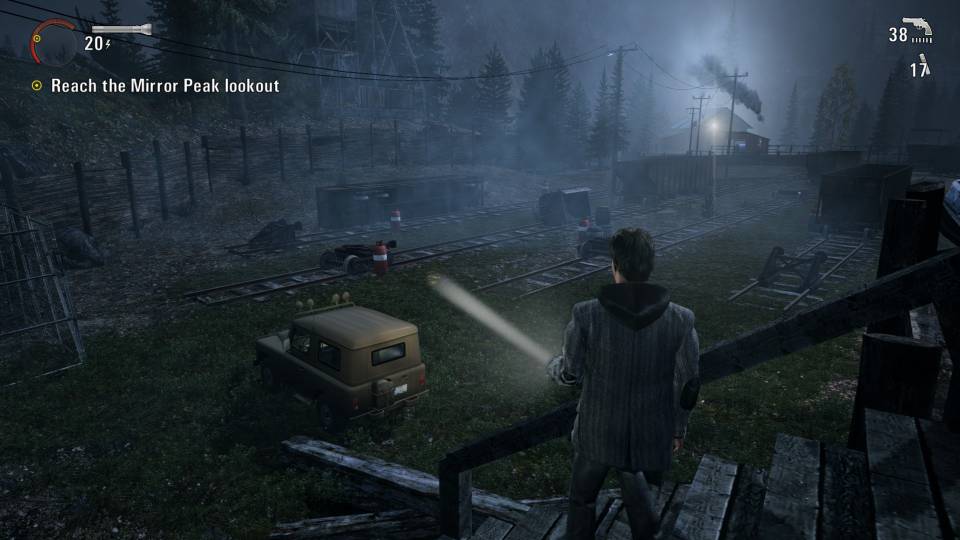Some Thoughts On Alan Wake
By rorie 41 Comments
I never got the chance to play Alan Wake on Xbox, but, now that I've picked it up on Steam, I'm fairly glad that I missed it. That...sounds strange, I think: I actually liked the game quite a bit, but I'm glad I waited for the PC port, since it was one of the better PC ports to come along in recent memory. It's superlative, really; it runs beautifully on high settings and looks pretty spectacular to boot, without a single crash or glitch sticking in my memory. In truth, it's been a pretty good few years for PC ports, but Alan Wake seems to be at the upper end of the range of quality. Borderlands probably comes in near the bottom, at least of the games that I've played; any game that actually forces you to open ports to play multiplayer deserves all the scorn it got, even if it was fairly fun once you fixed the FOV problems. The middle ground is filled with Skyrim-like games that are serviceable ports: relatively uncomplicated, but not doing much to take advantage of the PC platform. (While Skyrim was perfectly playable, its UI was pretty bad on the PC, and it took them quite a while to release that high-res textures pack, if I recall.)

Anyway, Alan Wake was fairly fun, although it's also interesting to consider it as a piece with American Nightmare, which is an odd example of iterative gameplay in that the follow-up DLC makes some pretty drastic changes to its predecessor's gameplay and overall style. It's difficult to get into the minutia unless you've played both games, and I feel like a bit of a philistine when I say that American Nightmare feels like the kind of game that I'd much prefer to play again, given the choice. If you've played Alan Wake, but not American Nightmare, here are some of the basic changes:
- Flashlight charges much more rapidly, going to full strength within a couple of seconds of being drained. The flashlight doesn't grant any darkness-busting powers unless it's focused this time around, but you still only need batteries in dire emergencies.
- You can sprint for a longer duration before getting tired. Like, much longer: probably 4x the time/distance, at least. Makes a pretty large tactical difference.
- Many more weapons to choose from, especially in the handgun slot (magnum, 9mm, SMG, etc.)
- An ammo change that eliminates most ammo boxes to being either for big guns or small guns; no more separate shotgun/rifle ammo, in other words. If you find a box of small-gun ammo, it'll fill up your SMG or Magnum or 9mm, regardless of what you're carrying.
- Larger maps that enable you to freely roam/explore a bit. Alan Wake did a good job of hiding its linearity with excursions to hidden chests and goodies, but my appetite for exploration was hampered by some poor checkpoint placement, meaning that I'd sometime go a minute or two to find a hidden chest, return to the path, die, and then have to do it all over again. The three maps in American Nightmare are much more free-form, even if you will sometimes go poking around without finding anything.
- Speaking of items, you're much more restricted in the amount of items you can carry, with a maximum of five flares/flashbangs in your pockets, and seemingly much fewer flaregun rounds. Flashbangs were also greatly nerfed, in that they'll strip away enemies' darkness shield without killing them outright, and even the flaregun doesn't feel like the BFG it was previously. This helps balance out the sprint/flashlight
- Many fewer cutscenes. This is a big bonus in my eyes.
I really have no idea what kind of feedback Remedy got regarding the original Alan Wake, but I assume that most of the changes above were reactions to people's impressions of the first game, almost all of said changes are positive, in my eyes. I liked Alan Wake well enough, when I was actually playing it, but the cutscene frequency was a bit ponderous, and they were pre-rendered, so you couldn't skip a line in a conversation without skipping the entire thing. In American Nightmare, most conversations are in-engine, with a short initial conversation that told you the bare minimum, and optional back-and-forths that you can pursue if you really want. (It is a bit funny that all of the people you encounter are sexy ladies, regardless of whether they're mechanics or astronomers or art festival directors, but you can forgive that when you realize that American Nightmare is suppose to literally be an episode of a television show, unlike Alan Wake, which never seemed to know what it wanted to do with its "episode" structure, aside from making it more easy to generate DLC.)
American Nightmare isn't as strong, plot-wise, as Alan Wake, but then, I didn't think Alan Wake was necessarily all that brilliant anyway. The actual gameplay was what occasionally spooked me out; the creepy lady in black and the rest of it didn't really do much for me. American Nightmare also benefits greatly from a lack of Barry, Alan's obnoxious sidekick from the original game. I railed against him on Twitter, and was roundly told by many a person that I'd like him better by the end of the game, but nope! Pretty much annoying all the way through the game. Barely standable, to the point where I debated not even finishing the game when I was subjected to the lengthy farm sequence where he's your sidekick. That's aside from the general over-reliance on Stephen King tropes to drive its plot. I don't particularly care about Alan Wake's fiction, in other words; I mostly enjoy it for the actual gameplay. After a while I even found myself skipping cutscenes outright.
Another sticking point for me was the preponderance of manuscript pages to be found and read. There was a bit of a quandary for me here: I'm sure that the game intends for you to read the manuscript pages as you pick them up, but when they started revealing what was going to happen to people before I had actually encountered those events, I figured that it was better to just pick them up and leave them unread. (I've done the same thing in American Nightmare, which seems to realize that maybe the whole system was screwy to begin with, since it gives you another reason to find the pages: they unlock weapons chests with more powerful weapons in them, whether you've read them or not.) I don't particularly mind supplementary info and world-building textual documents in games (you can bet I read all the newspapers and emails in Deus Ex: Human Revolution, for instance), but when a game starts explicitly spoiling events that haven't even happened yet, that...is weird.

To be fair, American Nightmare does recycle a fair amount of content, making you play through the same areas multiple times thanks to a "time loop" plot. Since the game was originally a DLC-exclusive, I can see the need to cut down on the filesize, and since you spend far more time fighting things than watching cutscenes, I don't mind it all that much. It feels less challenging than Alan Wake did, thanks to the preponderance of ammo, but that's not so terrible since it allows you to fight more enemies more often.
For the $7.50 or whatever that I wound up paying for it, it's hard not to consider Alan Wake to be a pretty damn good deal. I don't particularly think it's presentation or story are all that hot, but it's easy enough to skip everything you might not care about in favor of shooting up some Taken. At the same time, you know that the folks at Remedy had to have had some bitter discussions on the changes made for American Nightmare. It's entirely possible that the stripped-down feel to it might be a result of a much smaller budget, but in the end I hope they incorporate most of the design decisions from it into whatever Alan Wake 2 happens to become.
(I posted this on my blog, but I figured since it was about video games it might as well go here, too!)
